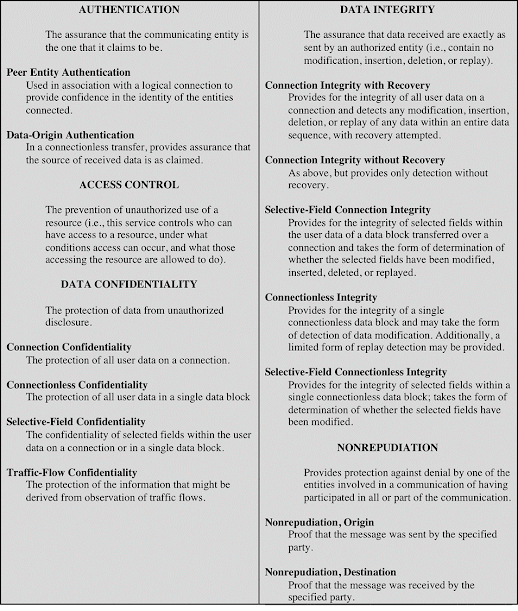Security Services (X.800):-
Requirements X.800 defines security services in following
categories.
- Authentication
- Access control
- Data confidentiality
- Data integrity
- Nonrepudiation
- Availability services
1. Authentication:-
The authentication service is concerned with assuring that a communication is authentic:
- The recipient of the message should be sure that the message came from the source that it claims to be
- All communicating parties should be sure that the connection is not interfered with by unauthorized party.
Example: consider a person, using online banking service. Both the user and the bank should be assured in identities of each other.
2. Access control:-
The prevention of unauthorized use of a resource (i.e., this
service controls who can have access to a
resource, under what conditions access can occur, and what
those accessing the resource are allowed to
do).
3. Data confidentiality:-
Protection of data from unauthorized disclosure. It
includes:
- Connection confidentiality
- Connectionless confidentiality
- Selective field confidentiality
- Traffic-Flow Confidentiality
4. Data Integrity:-
The assurance that data received are exactly as sent by an authorized entity (i.e., contain no modification, insertion, deletion, or replay).
5. Nonrepudiation:-
Provides protection against denial by one of the entities
involved in a communication of having
participated in all or part of the communication.
Nonrepudiation can be related to
- Origin: proof that the message was sent by the specified party
- Destination: proof that the message was received by the specified party
Example: Imagine a user of online banking who has made a
transaction, but later denied that. How the
bank can protect itself in such situation?
6. Availability service:-
The property of a system or a system resource being accessible and usable upon demand by an authorized system entity, according to performance specifications for the system (i.e., a system is available if it provides services according to the system design whenever users request them).




0 Comments